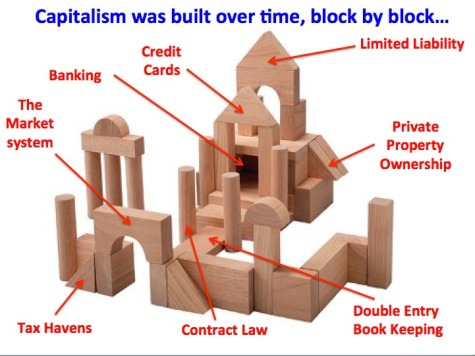The transition from a capitalist to a cooperative economy could be one of the defining achievements of the 21st century.

In history, everything changes. The foundations of capitalism were built by merchants and mercantilists in the 16th and 17th centuries in response to the oppressiveness of feudalism. It developed into full-fledged industrial capitalism in the 18th and 19th centuries, and into financial capitalism at the end of the 20th century, using global free trade, shadow banking and offshore tax havens to overpower and sidestep much government taxation, regulation and control.
During the past five centuries, powered by the phenomenal stored energy of fossil fuels, the genius of free market capitalism has enabled the most incredible transformation the world has ever seen, lifting billions out of hunger and poverty, advancing science and engineering to incredible achievements, and enabling parallel social advances in literacy, education, health care, welfare, civil rights, communications and democracy. Its human and environmental costs have been huge, but we should not deny it its achievements. We are all the beneficiaries of its success, whether through health-care advances, digital technologies or the development of global consciousness thanks to the ease of travel.
Today, capitalism may appear stronger than ever, but its strength is increasingly delusional. It almost collapsed in 2008, and was only revived by a massive infusion of public money. Its financial foundations are deeply cracked, with trillions being staked on high-risk financial derivatives few can understand, and its social license is rapidly evaporating. A popular revolt is brewing, fed by three factors:
- Deep resentment at the accumulation of untold wealth in the hands of tax-avoiding corporations and elites while the majority of humanity struggles, and while communities and individuals all around the world suffer pollution and contamination as a result of capitalistic activity;
- The increasing indebtedness of state and national governments due to tax evasion and corporate influence over tax regimes, resulting in painful ‘austerity’ cuts to welfare, healthcare, education and other essential services;
- The well-referenced reality that global free market capitalism is driving global civilization towards the cliffs of climate and ecological collapse, threatening disaster to humanity and the species we share the planet with.
In response, a new green, entrepreneurial, co-operative economy is arising. Capitalism may appear to be a complex integrated system, but it was built over time, block-by-block and law-by-law by individuals and teams of people. The same is true of the new economy: it is being built block-by-block and law-by-law.
We do not have centuries to play with, however, as the founders of capitalism did. The need to prevent ecological and climate collapse is so urgent that if we are to stop the rising global temperature from blowing through the 2°C mark we need to reduce our carbon pollution by 10% a year—far faster anything being considered in global climate negotiations.
Read more here.























